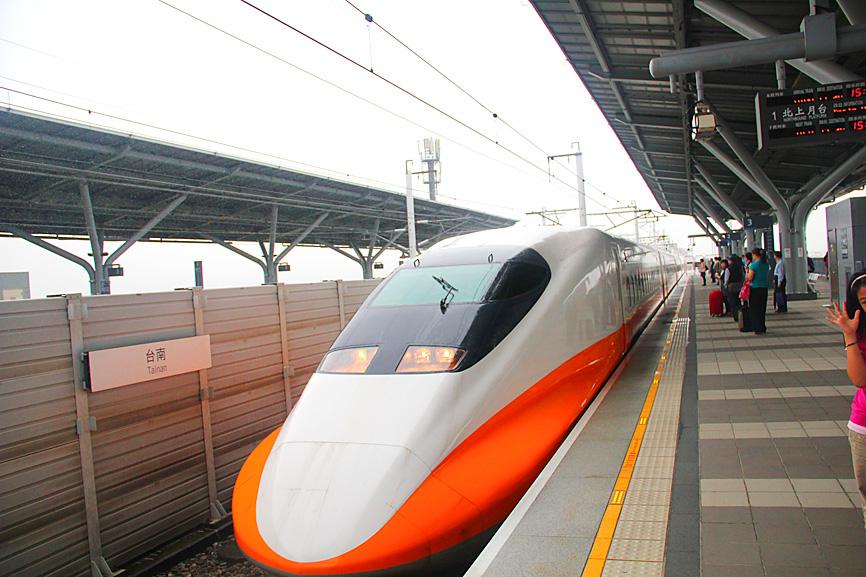The government began evaluating the feasibility of building a high-speed rail (HSR) extension from Taipei to Yilan 21 years ago, the Railway Bureau said yesterday, adding that it did not cut corners by scrapping the feasibility study of the project.
While the bureau has yet to complete a preliminary assessment of the Yilan extension, such as the location for a terminal station, critics accused Ministry of Transportation and Communications officials of “trampling procedural justice” and “allowing politics to transcend professionalism.”
The ministry began assessing the feasibility of extending the line to Yilan in 2000, the bureau said, adding that it dropped the plan due to the terms of the contract between the government and Taiwan High Speed Rail Corp.

Photo: Cheng Wei-chi, Taipei Times
The ministry in 2004 completed plans to build a straight railway line connecting Taipei and Yilan instead of a longer, circuitous route along the northeast coast. The straight-line plan was rejected by the Environmental Protection Administration’s assessment committee in 2006.
The ministry in 2009 began new research into possible ways to increase train speed between the Taiwan Railway Administration’s (TRA) Nangang Station and Hualien Station, the bureau said.
In November 2011, the Executive Yuan allowed the ministry to formulate a comprehensive plan for the project, but it instructed it to consider every possible option and conduct a comprehensive analysis, the bureau said.
The plan, completed in September 2013, showed that a straight railway route connecting Taipei and Yilan would have a limited effect on easing railway service congestion between Shulin Station in New Taipei City and Cidu (七堵) in Keelung, as all newly added train services could only depart from Taipei’s Nangang District (南港).
The straight route would increase the complexity of the TRA’s operation, the bureau said, adding that the line would involve housing relocations in Nangang.
“The high-speed rail station in Nangang can be expanded to accommodate more train services. As such, it has been one of the options under consideration,” the bureau said.
The feasibility research for the high-speed rail extension to Yilan is to be conducted based on data and studies that the ministry has been accumulating for more than two decades for the straight route between Taipei and Yilan, the bureau said, adding that the plan needs to be approved by the Ministry of Transportation and Communications and the Executive Yuan.

Alain Robert, known as the "French Spider-Man," praised Alex Honnold as exceptionally well-prepared after the US climber completed a free solo ascent of Taipei 101 yesterday. Robert said Honnold's ascent of the 508m-tall skyscraper in just more than one-and-a-half hours without using safety ropes or equipment was a remarkable achievement. "This is my life," he said in an interview conducted in French, adding that he liked the feeling of being "on the edge of danger." The 63-year-old Frenchman climbed Taipei 101 using ropes in December 2004, taking about four hours to reach the top. On a one-to-10 scale of difficulty, Robert said Taipei 101

Nipah virus infection is to be officially listed as a category 5 notifiable infectious disease in Taiwan in March, while clinical treatment guidelines are being formulated, the Centers for Disease Control (CDC) said yesterday. With Nipah infections being reported in other countries and considering its relatively high fatality rate, the centers on Jan. 16 announced that it would be listed as a notifiable infectious disease to bolster the nation’s systematic early warning system and increase public awareness, the CDC said. Bangladesh reported four fatal cases last year in separate districts, with three linked to raw date palm sap consumption, CDC Epidemic Intelligence

US climber Alex Honnold left Taiwan this morning a day after completing a free-solo ascent of Taipei 101, a feat that drew cheers from onlookers and gained widespread international attention. Honnold yesterday scaled the 101-story skyscraper without a rope or safety harness. The climb — the highest urban free-solo ascent ever attempted — took just more than 90 minutes and was streamed live on Netflix. It was covered by major international news outlets including CNN, the New York Times, the Guardian and the Wall Street Journal. As Honnold prepared to leave Taiwan today, he attracted a crowd when he and his wife, Sanni,

Two Taiwanese prosecutors were questioned by Chinese security personnel at their hotel during a trip to China’s Henan Province this month, the Mainland Affairs Council (MAC) said yesterday. The officers had personal information on the prosecutors, including “when they were assigned to their posts, their work locations and job titles,” MAC Deputy Minister and spokesman Liang Wen-chieh (梁文傑) said. On top of asking about their agencies and positions, the officers also questioned the prosecutors about the Cross-Strait Joint Crime-Fighting and Judicial Mutual Assistance Agreement, a pact that serves as the framework for Taiwan-China cooperation on combating crime and providing judicial assistance, Liang